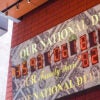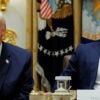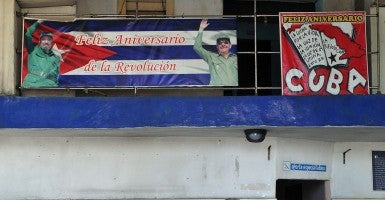Castro’s Cuba, America’s sworn enemy in our hemisphere, is exploiting the breach between academia and the nation. An unclassified FBI advisory published Sept. 2 was clear on the subject: “The Cuban intelligence services (CuIS) are known to actively target the US academic world for the purposes of recruiting agents, in order to both obtain useful information and conduct influence activities.”
I wrote on Sept. 1 that faculty, especially those who teach Middle Eastern and Latin American studies at our universities, had not just embraced leftist ideologies but had systematically stamped out dissent. For this reason, The Heritage Foundation called for cutting off funding for Title VI of the Higher Education Act, which subsidizes area studies centers at universities throughout the country.
>>> First Look: Mike Gonzalez’s ‘A Race for the Future’
Latin American study centers, we warned, had become “the entry points for ideologies inimical to our national interest, while failing to carry out the main task of academic work: truth discovery.”
The FBI apparently agrees: “The CuIS have developed a network of collaborators and agents located in Cuban universities and cultural centers, who are used to recruit and influence their counterparts in the United States or third countries, under the guidance and instruction of Cuban intelligence officers, who instruct them on what steps to follow.”
Cuban intelligence targets both professors and students, in the hope that one day they will work for the U.S. government or otherwise use their intellectual megaphone to influence the U.S. government and society.
The professors can be turned into traitors out of pecuniary interests, the FBI claimed in the report: “The Cuban regime does not have unlimited funds to draw on, but can offer privileges and opportunities to invest in Cuba or to negotiate exclusive business dealsSome individuals are promised business opportunities once the US embargo is lifted. Such individuals can be feted in Cuba with extravagant, all-expense paid tours.”
Most damning is that one of the methods to recruit professors as traitors “can include appealing to the individual’s political or ideological leanings. For instance, someone who is allied with communist or leftist ideology may assist the CuIS because of his/her personal beliefs.”
Anyone even superficially familiar with the support the Castro brothers have received from the faculty lounge during their 60-year suppression of the Cuban people will not be surprised to read this FBI report.
I recently debated two U.S. academics on TV. One denied there was any repression in Cuba; the other suggested YouTube videos of dissidents being beat up on Cuban streets might be concocted by Cuban Americans.
Given this, one is tempted to think the CuIS is wasting its money: These people will carry the Castros’ water for free. Either way, there is no reason U.S. taxpayers should pay their way.
We take no pleasure in sharing the FBI report. This is one where we wished we might have been wrong.































